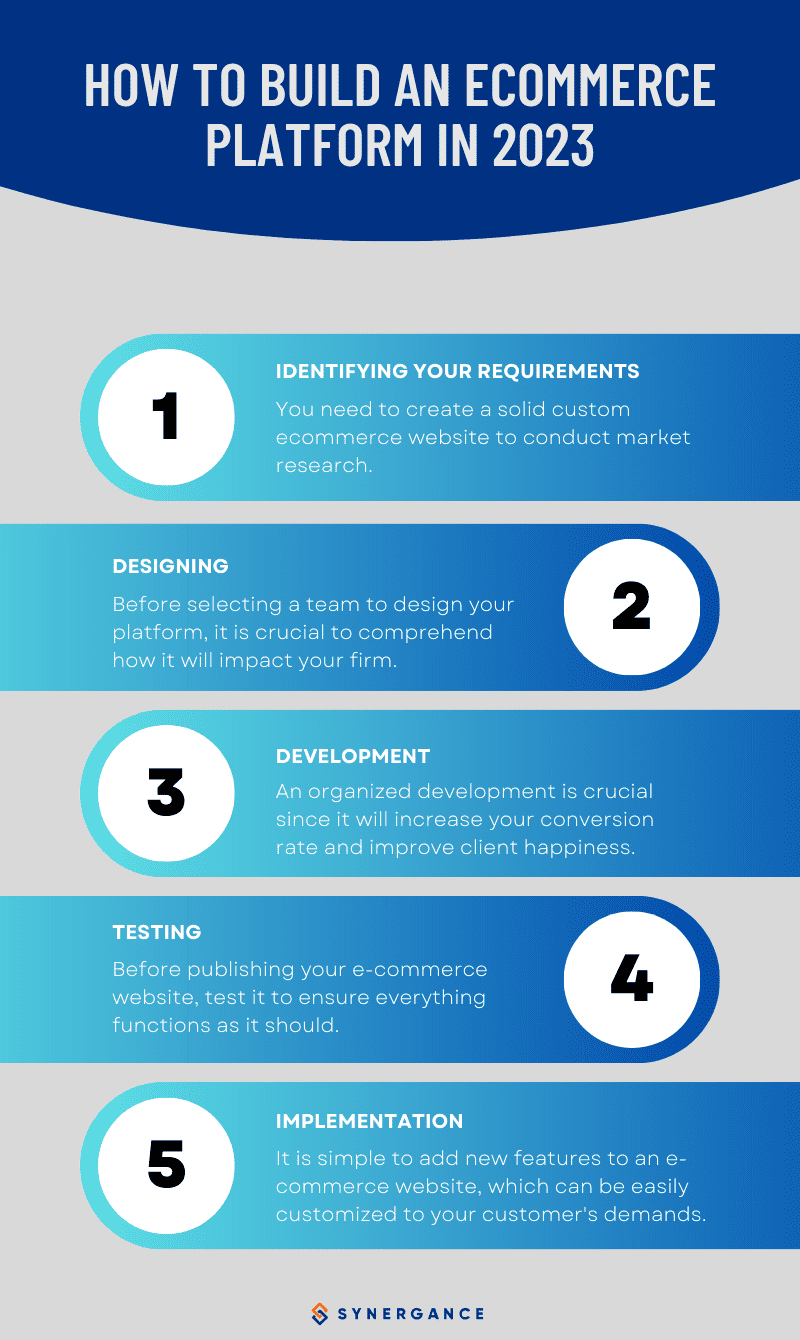
A Guide to Custom ecommerce Platform Development Process in 2023
The ecommerce industry continues to evolve at an unprecedented pace, and businesses must keep up with the latest trends and technologies to remain competitive. As a result, custom ecommerce platform development has become a critical aspect of any online retail business in 2023.
In this guide, we provide a comprehensive overview of the custom ecommerce website development process, taking into account the latest trends and technologies in the industry. Whether you’re just starting out or looking to upgrade your existing platform, this guide will help you navigate the complex and ever-changing landscape of custom ecommerce platform development.
How to Build an Ecommerce Platform in 2023

If you are planning to build a custom ecommerce website, you need to know how to add ecommerce to website development and create a successful online store. This guide will tell you what to expect when working with a reputable ecommerce development agency in 2023.
Need help navigating the complex and ever-changing landscape of custom ecommerce development in 2023? Look no further than Synergance. Our team of experts has the experience, knowledge, and skills to guide you through the process and help you succeed.
1. Identifying Your Requirements
A custom ecommerce platform is a software solution that is designed for specific business needs. It is a great way to enhance your online presence and grow your business. The first step to building a strong custom ecommerce website is researching your target market. This will help you create effective product categories, descriptions, payment gateways, and other features.
When developing the best ecommerce SEO platform, you must consider several factors. First, you must identify your requirements. These requirements are the features and functionalities that your customers will need.

To determine these requirements, you must conduct research. You can do this through focus groups or customer interviews. Another approach is to perform competitor analysis. This will help you figure out what other businesses offer and how they are different from yours.
Once you have identified your requirements, you must design your custom ecommerce solution. This will require a lot of effort, but it will pay off in the end. You will also need to choose the right developer. You can do this by evaluating their portfolio, client reviews, and experience in the industry.
Ideally, you should hire a team that is experienced in designing and building custom software solutions. You should assign a chief technology officer (CTO) to make the most of your team’s abilities. This person will develop a technical vision for the project and distribute the roles to the development team. This will help you avoid mistakes and delays in your project.
The CTO will set the overall development process and hold developers accountable for their work. This will ensure that the project moves along on schedule and that everyone is on the same page.
The CTO may be a business owner or an IT specialist. Regardless, the CTO should be someone who can describe tasks in a clear and concise manner and stick to them. They should also be able to use the best possible tools and communication channels.
2. Designing
Designing and developing the best ecommerce platform for startups takes time, work, and expertise. It is important to understand the process and how it will affect your business before you choose a developer or team to build your platform.
First, you need to decide what type of ecommerce website you want to create. This will help you determine the right technology stack for your solution. Using the right technology can make all the difference in how quickly your custom ecommerce website is ready to launch. It can also ensure that your site is mobile-friendly and easy to use.
A good tech stack is essential for building a successful custom ecommerce website management. It should include apps, frameworks, and languages that will support your back-end and front-end development. These technologies include CSS, HTML, JavaScript, and React.
In addition, you should make sure that your ecommerce website supports SSL, which will encrypt user data and protect it from hackers. This is especially important if you sell sensitive information such as credit card numbers or other personal details.
You should also consider the layout of your ecommerce website and how it will work on different screens. This will help you create an online store that is easy to navigate and uses high-quality images to showcase each product.
It is also important to consider how your ecommerce platform will scale as your business grows. You need to ensure that the system can handle a large number of users and increase sales without slowing down or crashing.
A scalable ecommerce platform can also make your business more competitive and profitable. It can increase your conversion rates and improve search engine optimisation. This will give your customers a better experience and make them more likely to return to your store again.
Ready to take your online retail business to the next level in 2023? Contact Synergance today and let our team of expert developers help you build a custom ecommerce platform that meets your unique needs and exceeds your expectations.
3. Development
Building the best ecommerce SEO platform takes time and effort. You need to work with a team that has experience in designing and developing SEO-friendly websites. In addition, you need to consider your budget.
A custom ecommerce website is different from an off-the-shelf solution because it is specifically designed to meet your needs and target audience. This is important because it will provide you with a higher conversion rate and better customer satisfaction.
The custom ecommerce website development process includes designing, coding, and testing the website. This is done to ensure that the website is as functional and attractive as possible. It also helps to improve your search engine optimisation (SEO) and digital marketing strategy.
To design an ecommerce site, you need to think about user experience (UX). The main goal is to create an intuitive interface that is easy to use and navigate. Make sure that it looks great on desktops, laptops, and mobile devices. You need to ensure that it can handle high amounts of data and is secure. It is also important to ensure that your custom ecommerce website management can handle the traffic it gets.

You should include voice search functionality in your custom ecommerce platform to streamline the shopping process and make it easier for users to find what they need. You should also take into account voice search. This is important because many people have started using their phones’ voice assistants to shop online.
Another important aspect of custom ecommerce platform development is ensuring that all the features work properly. This is especially important when it comes to the checkout process and payment methods. You should test all of them to make sure that they are working correctly and that your customers have a positive experience.
4. Testing
Having your own custom ecommerce platform gives you control over your sales, marketing, and content strategy. It also allows you to build a scalable, robust, flexible website that meets your unique needs.
The process of custom ecommerce development is often more time-consuming than off-the-shelf solutions, but it can be well worth the effort. When you have a clear set of requirements and your budget is flexible, custom software development may be the best way to achieve your goals.
You should test your ecommerce site before putting it on the market to make sure it works as expected. This will ensure that you don’t lose money or damage your reputation in the industry.
A good testing strategy will also include mobile-friendliness and responsive design, which are crucial for users around the world to use. This will help you avoid having your site load too slowly or fail to perform as it should on different devices.
Another important aspect is how easy it is to customise your site with add-ons and features that your customers need. This will improve your conversion rates and increase customer loyalty.
Many businesses prioritise a strong back office, so it’s critical to choose the best ecommerce platform for startups that supports their business’s unique needs and provides a rich set of integrations with the ERP, OMS, PIM or CRM systems they already use.
In addition, consider what kinds of digital marketing you rely on and how you can leverage data to serve your customers better. You can create personalised client experiences by connecting your data with AI-based tools to deliver customised recommendations and real-time insights that help them make informed decisions.
It’s also worth checking out what kinds of analytics your ecommerce platform can provide, as this will allow you to track user behaviour and improve your performance. This will be a valuable resource as you expand your business.
Want to stay ahead of the curve in the ecommerce industry in 2023? Choose Synergance for custom ecommerce development. Our team is dedicated to delivering innovative, user-friendly platforms that drive sales and increase customer engagement.
5. Implementation
A custom ecommerce platform is an ideal solution for small and medium-sized businesses that want to increase their sales. It can be tailored to the needs of your business and customers and is easy to update with new features as your needs change.
When choosing an ecommerce platform, it is important to choose one with a high uptime record and the capability to handle the traffic your business needs. In addition, look for a platform that allows unlimited API calls and pages that load quickly.
Your custom ecommerce website will be displayed on a variety of devices, so it is essential to have a mobile-friendly design. It should also load quickly and be responsive to all screen sizes.
Another critical feature of an ecommerce platform is the ability to accept payments, tax calculations, and shipping label printing. Some platforms have all of these functions built into the software, while others require integration with third-party services.
The best ecommerce SEO platform will offer multiple payment gateways, a robust inventory system, and shipping options for both sellers and buyers. This will ensure that the right products are available when customers need them and will make it easier to manage their orders.
It is also important to choose an ecommerce platform that supports SSL and HTTPS authentication for secure transactions. This is especially important for credit card and personal data.
When you have the best ecommerce platform for startups that works for you, it will be easier to build customer loyalty and trust. This will encourage customers to return and shop more frequently.
Once your ecommerce platform is built, it is time to test it. You should run tests for both the front-end and back-end of the site to make sure that all functions work properly. This includes testing the checkout process and all payment methods. This will help you identify any bugs or glitches that may occur. You will also want to perform ongoing maintenance to make sure that all features are working correctly.
Conclusion
In conclusion, custom ecommerce platform development will be a crucial aspect of any online retail business in 2023. With the right approach and expert guidance, you can create a platform that meets the unique needs of your business, drives sales, and provides a seamless shopping experience for your customers. Stay up-to-date with the latest trends and technologies, and continually strive to improve and optimise your platform.
Remember, the custom ecommerce website development process is a journey, not a destination, so keep learning, experimenting and evolving. By following the principles outlined in this guide, you can build a custom ecommerce platform that will help you succeed in the rapidly-changing ecommerce landscape of 2023 and beyond.
Need a partner for custom ecommerce website development in 2023? Synergance is here to help. We offer a range of services, from consultation and strategy to development and optimization, to help you achieve your goals and succeed in the competitive ecommerce landscape.